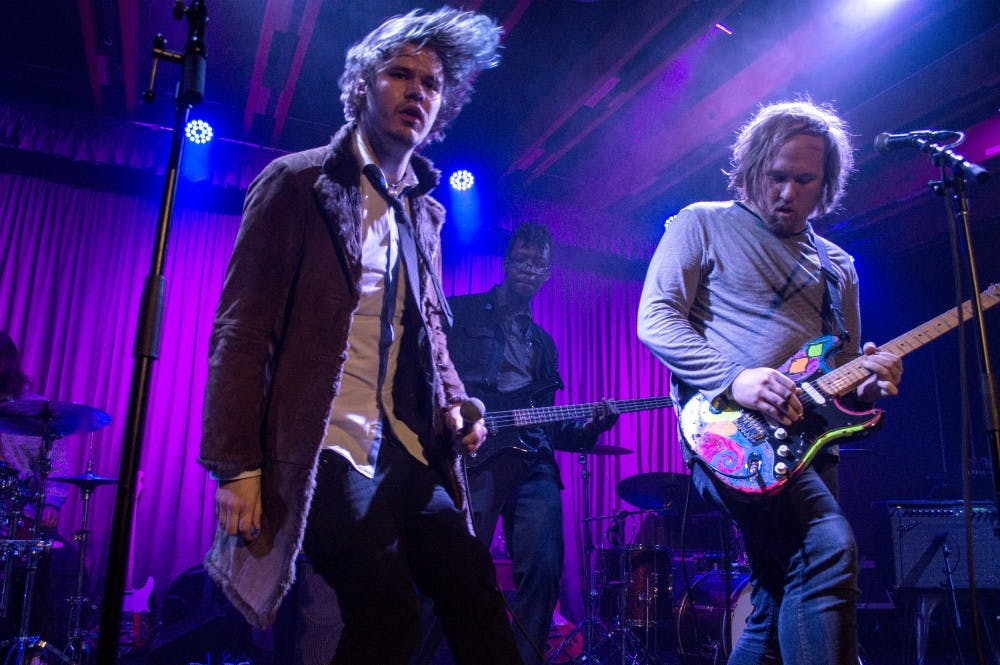A local charity is dedicated to bringing music education to youth in an era where music programs are often secondary to other subjects like English or math, and the local music community showcased their own talents to help out.
Local rock bands performed at Cover the Crescent last Thursday, a music event at the Crescent Ballroom in Downtown Phoenix that aimed to settle an age-old music question: The Beatles or The Rolling Stones? The show benefitted Sounds Academy, a nonprofit that provides music lessons and access to musical instruments for kids in the Phoenix area.
Kirk Johnson, the founder and director of the Sounds Academy, said that ideally, all kids would have access to music education through their schools. But he said there are many reasons why that isn’t always the case, including a lack of resources in some areas, and that fact that some people believe music and arts education is less important than other subjects.
Johnson said Sounds Academy tracks GPA and sees growth in leadership skills through the program, but that the most important thing he believes kids learn from the Sounds Academy is self-esteem, and the ability to learn how to face a tough challenge without giving up.
“If you can learn how to be great at something, you can learn how to be great at a lot of things, because it’s the same meticulous type of practice that gets you there,” he said.
Johnson said Sounds Academy students also attend a college day at ASU, where some of the professors from the School of Music talk to the kids about auditioning and financial aid. The ASU students also talk about campus life and clubs they could be involved in if they decide to attend ASU.
Johnson said he believes exposing kids to the greater opportunities can help expand their minds and ultimately show them all the different options for career paths in the future.
He said Sound Academy is always looking for volunteers and offers internships in marketing, fundraising and research analysis.
Megan Seeds, a graduate student at ASU came out to the concert to support her boyfriend Paul Balazs, who played keyboard in the band Hostile Work Environment for the night.
Other bands that performed at the event include Wyves, The Breakup Society, Decker, Weird Radicals and the The School of Rock Sugar Skulls.
Seeds is working on an M.S. Tech in Aviation Management and Human Factors degree, but went to an art high school in her hometown of West Palm Beach, Florida. She said music education is “absolutely necessary” and gives kids motivation to show up to school, describing how she would sometimes show up to school two hours early in order to participate in artistic programs.
Roger Mantie, a professor at ASU’s School of Music said he believes that music education can lead to an increase in self-esteem and engagement in school, especially in areas where the students have access to fewer resources.
“Music and the arts are the very thing in less resourced or impoverished areas that are the kind of subjects that help students,” he said. “Not just academically, but they help them stay in school, be more passionate about school and engage in school.”
Mantie said programs like Sounds Academy that provide music education to students that wouldn’t otherwise have it are “a wonderful thing” but said he believes music and art programs should already be a priority in schools.
“Schools should be providing that as part of their educational program,” he said.
Mantie, who taught music in public schools for 14 years before getting his Ph.D, said that while there are many schools in the country with excellent music and arts programs, in some cases those programs are cut to give students more instruction on subjects like math and English, which are subject to mandatory testing.
He said some of the areas that have experienced the greatest cuts are in areas of lower socioeconomic status, which are often the students who can benefit from exposure the most.
“One of the reasons why music teaching ended up in the schools was because of a belief that music instruction should not be something restricted to the privileged few wealthy enough to pay for it,” he said.
Reach the reporter at jspearin@asu.edu or follow @JasmineDesiree3 on Twitter.
Like The State Press on Facebook and follow @statepress on Twitter.




